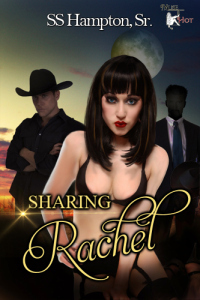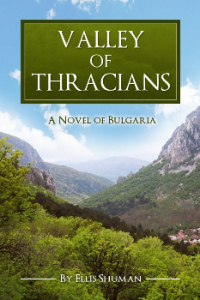Sara Jayne Townsend's Blog, page 16
February 12, 2015
The Ten Commandments of Writing #1: Thou Shalt Make Time To Write
(Cross-posted on the WriteClub blog)
Just about all writers have that encounter, sooner or later, at a party or some other social event where they get chatting to someone who asks that stock question, “what do you do?”. When they discover the answer is “writer”, the person says airily, “oh, I always wanted to write a book. If I could ever find the time.”
I’ve always believed that being a writer is not something anyone chooses to be, any more than we choose the colour of our eyes, or our skin, or whether we are left or right-handed. What we do choose, however, is whether or not to be a successful writer. And the first step in being a successful writer is finding time to write.
It’s the stock excuse for many aspiring writers:��I could finish my book if only I had more time to write. I used it myself for quite a long time. My first published novel, SUFFER THE CHILDREN, took me ten years to write. I used a variety of excuses to try to explain this, but really they were just excuses. Fledgling writers find excuses not to write for many reasons. The most common, if we’re honest with ourselves I think, is lack of confidence. But taking ten years to write a book is a luxury only afforded to the unpublished writer, or ironically, the very successful.��If you’re Stephen King or JK Rowling, your loyal fans will probably wait ten years for the next book, if they had to, and still be there to buy the book at the end of it. For the rest of us, it’s worth bearing in mind that there are many writers out there to attract your potential readers when they get bored of waiting for you.
The stark reality is that writers have no more hours in the day than anyone else. Finding time to write is simply a matter of ensuring you block off some of those hours for writing. Many writers, like me, have full time day jobs. Some have kids and school and hockey runs to deal with, elderly relatives to care for, yoga lessons, football practice, swimming lessons, or even a combination of all of the above. Modern life is extremely busy. But amongst all this, the writer must carve out time to write.
What works for me is getting up at a stupidly early hour and getting the early train into London. I sit in Starbucks round the corner from work, and have a soya latte and a muffin for breakfast while I wait for the NetBook to boot up. I try to get an hour of writing in before I head for the office to start my working day. I find this hour very productive, and in truth I get more done in that hour than I do if I take a day off work and write at home.
I appreciate not everyone can face getting up at 5:30am. Fifteen years ago I wouldn’t have thought I could have done it, either. But I have discovered that this is the best time for me for writing. It may have something to do with tapping into the muse before��my internal editor wakes up, but I find the words flow first thing in the morning when I am not properly awake. Some writers I know carve out an hour of writing time when the kids are in bed. Some find that writing late at night works for them. The key is to find what works for you and schedule it into your routine. Block off the time in your diary. Make sure that your family members also know that this particular time is Writing Time, and you are not to be disturbed.
Making time to write in a packed life generally means sacrificing something. For me, it’s sleep. Other writers I know have stopped watching TV, opting instead to use that time as writing time. If your schedule is absolutely rammed, have a look at what you can change to fit in some writing time. If you get a lunch hour at work, can you leave your workplace and set up in a nearby caf�� or some such to use that time for writing? If you regularly meet friends at the pub twice a week, can you cut down to one a week and use the other evening as writing time? If necessary, try experimenting until you find a routine that works for you. As I mentioned, it never occurred to me once upon a time that I could get out of bed so early. But once I got in the routine of doing so, I found it not so bad, and the thought of a nice sugary treat when I get to the coffee shop does sometimes inspire me out of bed at that unseemly hour in the morning.
But the most important thing, in order to be a successful writer, is to write, and so this is my First Commandment of Writing: Writer, Thou Shalt Make Time To Write.

February 9, 2015
Monday’s Friend: Luke Walker
Today I am pleased to welcome back one of my favourite repeat guests, British horror writer Luke Walker. Luke has just released his first collection of short stories, entitled Die Laughing. I haven’t read this one yet, so cannot at this time verify the scariness of the contents, but that cover – eek! What is it about clowns?
Anyway, welcome once more to Imaginary Friends, Luke! Good to have you back.
THE POWER OF FICTION
By Luke Walker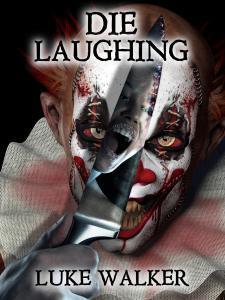 My collection Die Laughing contains eighteen stories that vary in length from 1200 words to about 9000, a story titled The Unmarked Grave. Now, 9k is getting on the long side for a short piece. It isn���t novella territory by any means���probably more novelette. It came a few months ago when I had a strange dream that involved me back in an area in which I used to live. I rounded a corner to see the road lined with shops and homes, heading towards buildings that grew progressively older until they became Victorian. Not just Victorian. Old. Decaying and close to abandoned, they were as creepy as you���d want in an horror film from Hammer; the creepy factor helped by the gloomy light and the fog that became thicker as I walked closer to it. My last clear image after waking was of a small church and its graveyard, both disused, both cold and lonely. While I had no idea what the dream meant, the imagery stayed with me and niggled until I came up with a plot that fit it. That plot, without giving too much away, involves Jack the Ripper (who else, given the imagery?) and a couple with the bad luck to become involved in long-dead history. I���m very happy with the finished story that came from a simple dream, and the dream no longer pokes and prods at me to turn it into fiction.
My collection Die Laughing contains eighteen stories that vary in length from 1200 words to about 9000, a story titled The Unmarked Grave. Now, 9k is getting on the long side for a short piece. It isn���t novella territory by any means���probably more novelette. It came a few months ago when I had a strange dream that involved me back in an area in which I used to live. I rounded a corner to see the road lined with shops and homes, heading towards buildings that grew progressively older until they became Victorian. Not just Victorian. Old. Decaying and close to abandoned, they were as creepy as you���d want in an horror film from Hammer; the creepy factor helped by the gloomy light and the fog that became thicker as I walked closer to it. My last clear image after waking was of a small church and its graveyard, both disused, both cold and lonely. While I had no idea what the dream meant, the imagery stayed with me and niggled until I came up with a plot that fit it. That plot, without giving too much away, involves Jack the Ripper (who else, given the imagery?) and a couple with the bad luck to become involved in long-dead history. I���m very happy with the finished story that came from a simple dream, and the dream no longer pokes and prods at me to turn it into fiction.
As horrible as The Unmarked Grave is (and as horrible as the other stories are), there���s a light at the end of the tunnel. I���ve included a piece called How To Live Forever as a sort of bonus album track. I could have placed it as the last story and been done with it, but I do see Die Laughing as finishing with a story set in a pub followed by a minute or so of silence before the bonus track kicks in. As How To Live Forever isn���t horror, you could argue it doesn���t fit in the collection. I say otherwise because the power of fiction to horrify, amuse or entertain is a power we shouldn���t ignore or overlook especially in difficult times. Fiction, even of the unpleasant, frightening sort, can save us. While things don���t work out for all of my characters in the stories and it sometimes doesn���t work out for us, we have to remember that sometimes it does.
The differences between the horror, despair and downer that is The Unmarked Grave and the slightly silly, slightly hopeful celebration of fiction that is How To Live Forever is my small way of reminding myself and anyone else who needs to hear it that sometimes it does work out.
Author bio:
Luke Walker has been reading and writing horror and fantasy fiction for as long as he can remember���probably since the age of eight when he borrowed his dad���s collection of Stephen King books before doing the same with his brother���s James Herbert���s. His first two novels, now out of print, were published in 2012 and 2013. His Lovecraftian novella, Mirror of the Nameless, was published by DarkFuse in 2013, and he���s currently at work on a new novel as well as another novella. He is thirty-seven and lives in England with his wife, two cats and more horror dvds than he knows what to do with.
Learn more about Luke from his website, or follow him on Twitter.
Die Laughing is available in paperback and Kindle format from Amazon UK and Amazon US.

February 4, 2015
The Ten Commandments of Writing: Introduction
(Cross-posted on the WriteClub blog)
Those of you who have been following this blog a while will know that I have been at this writing game for quite a while. In fact, I’ve been at it most of my life. I’ve been writing novels since I was 11 years old. I’ve been submitting my work since I was 17. I am now 45. I will leave you to work out for yourself just how many rejections that equates to, with the added note that just because I have stuff published DOES NOT mean I don’t get rejected any more. Nor does it mean those acceptances are any less sweet.
Anyway, when I got to thinking about just how long I’ve been at this game, it made me realise just how much I’ve learned along the way. And maybe I can pass on some of those things I have learned over the years to others, who may be just starting out on the whole writing/submitting/rejection carousel.
I will emphasise that I don’t have all the answers. The thing about writing is that you never stop learning about your craft. And the publishing world is a whole lot different than it was when I started out, when there was no internet and no email, and submissions had to be sent by post, with a stamped self addressed envelope, and markets had to be researched and the Writers’ & Artists’ Yearbook was the must-have publication for getting hold of publishers’ details.
No, I am by no means claiming to know everything about writing. If I did, I’d be making a great deal more money from it, and would be getting a lot more acceptances than rejections. But there are things I’ve learned along the way. Things that I wish I’d have known when I was starting. Things that might have led to that novel contract arriving a bit sooner than it did.
For the next few weeks, I am going to run a regular feature on this blog, featuring my version of the Ten Commandments of Writing. I am not claiming to be Moses, and unlike his mine are not written in stone. These will just be things I’ve learned along the way, that might help someone else as they try to negotiate the thorny path to publication.�� These will otherwise be known as the “Writer, Thou Shalt Not” rules.
Join me here at the same time next week for more information about the first commandment:�� “Writer, Thou Shalt Make Time to Write.”

February 2, 2015
Monday’s Friend: Stan Hampton, Sr
I am pleased to welcome back to the blog Stan Hampton Sr, who today is giving tips on how writers should be keeping track of expenses for tax claims, whether you are a full time writer or one with another income.
Do You Know What Time It Is?
By Stan Hampton, Sr
Belated Happy New Year and Pre-Valentine���s Day!
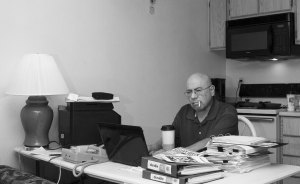 Anyway, no, this is not about the time of day or night. This is about the time of the year that faces almost everyone. Tax season!
Anyway, no, this is not about the time of day or night. This is about the time of the year that faces almost everyone. Tax season!
First and foremost, I am not a tax professional. For advice and tips, consult a tax professional. Let me repeat ��� for advice and tips, consult a tax professional.
Broadly speaking, most of us cannot support ourselves through writing advances and royalties. Yet. Our income comes from elsewhere. Now, on tax forms your income is where your writing income or (loss) is applied (as recorded on your Schedule C (Form 1040*), Profit or Loss From Business.) [*US tax claims] This gives your total income. After that comes adjustments to your income resulting in your Adjusted Gross Income. And of course, after that, comes all of the various taxes and credits with the end result of your either owing the government or the government owes you a refund.
So, like most of us you work at another job until your literary ship finally comes in.
But along the way to the harbor I suggest you keep track of your expenses that you can add up and claim as income or (loss) at the end of the tax year.
First, establish a spreadsheet with cumulative cost columns.
Did you buy a desk or a pair of folding tables to equip a room or a corner of your house or apartment to work at? Did you buy a computer for your writing? Did you buy additional literary or graphics software? How about a printer? What about inkjet cartridges and printing paper? Stapler, staple remover, staples, paper clips, binder clips, pens, pencils, file folders, and pads of paper? What about filing cabinets to store your research and drafts? Or 3-ring binders, with 3-hole punch? Maybe you make backup CD copies rather than keep paper copies. Dozens of blank CDs or even a separate storage device costs money.
There is even a provision that if you dedicate a portion of your home or apartment to your writing, you can claim a percentage of rent or mortgage, even insurance as writing expenses. If you use the Internet for research and communications, and you use your telephone in support of you writing, you can claim a percentage of the monthly bill for those too.
Speaking of research, if you go to the local library and Xerox pages out of books that are relevant to your writing, that costs money. It costs money if you buy books or even magazines with specific articles, to add to a research library. What if your writing takes place in an exotic location, such as belly dancing in Egypt. How familiar are you with belly dance music? Can you describe it? Suppose you want to become familiar with a type of music from a specific era, such as swing music from the 1940s. The cost of music CDs, in my humble opinion, counts as research���but do not go overboard.
So what if you attend book signings at libraries, book stores, coffee shops, book fairs, or even speak to a grade school or college class? Having bookmarks and business cards to hand out, for example, costs money.
If the host does not provide tables, you might have to buy a folding table to bring with you. Having business cards, banners, and bookmarks designed and printed costs money, even if you accomplish those at home. If you want to get more creative, you can personalize mouse pads, coffee mugs, note paper, and a thousand and one other things. As an aside, I suggest you get photographs of you and your table at public venues. It is further proof of your expenses.
And if you have to travel out of town for such events, even if you combine your travel with visiting friends and family, a percentage of your travel, food, and room cost can be counted as expenses.
I am sure that by now you are developing a good idea of how to approach the expense of writing in relation to income taxes.
More experienced writers will have additional helpful suggestions. Some may suggest that you incorporate and have business checking accounts separate from your personal accounts.
But no matter what���remember to CONSULT A TAX PROFESSIONAL when you set out to record your expenses in preparation for the tax year. Professional advice, even if you have to pay for it (not all of us have tax preparers in the family), is worth the money to avoid potential pitfalls.
In closing, I wish you much writing success this year. And remember to have fun!
AUTHOR BIO:
Stan Hampton, Sr. is a full-blood Choctaw of the Choctaw Nation of Oklahoma, a divorced grandfather to 13 wonderful grandchildren, and a published photographer and photojournalist. He retired on 1 July 2013 from the Army National Guard with the rank of Sergeant First Class; he previously served in the active duty Army (1974-1985), the Army Individual Ready Reserve (1985-1995) (mobilized for the Persian Gulf War), and enlisted in the Nevada Army National Guard in October 2004, after which he was mobilized for Federal active duty for almost three years. Hampton is a veteran of Operations Noble Eagle (2004-2006) and Iraqi Freedom (2006-2007) with deployment to northern Kuwait and several convoy security missions into Iraq.
His writings have appeared as stand-alone stories and in anthologies from Dark Opus Press, Edge Science Fiction & Fantasy, Melange Books, Musa Publishing, MuseItUp Publishing, Ravenous Romance, and as stand-alone stories in Horror Bound Magazine, The Harrow, and River Walk Journal, among others.
In May 2014 he graduated from the College of Southern Nevada with an Associate of Applied Science Degree in Photography ��� Commercial Photography Emphasis. A future goal is to study for a degree in archaeology���hopefully to someday work in and photograph underwater archaeology (and also learning to paint).
After 13 years of brown desert in the Southwest and overseas, he misses the Rocky Mountains, yellow aspens in the fall, running rivers, and a warm fireplace during snowy winters.
As of April 2014, after being in a 2-year Veterans Administration program for Homeless Veterans, Hampton is officially no longer a homeless Iraq War veteran, though he is still struggling to get back on his feet.
Dark Opus Press: https://www.createspace.com/3685965
Edge Science Fiction & Fantasy Publishing: http://www.edgewebsite.com/books/dansemacabre/dansemacabre.html
Musa Publishing: http://www.musapublishing.com/index.php?main_page=index&manufacturers_id=50
MuseItUp Publishing: https://museituppublishing.com/bookstore/index.php/museitup/mainstream/better-than-a-rabbit-s-foot-detail
Amazon.com Author Page: http://www.amazon.com/SS-Hampton-Sr/e/B00BJ9EVKQ
Amazon.com. UK Author Page: http://www.amazon.co.uk/SS-Hampton-Sr/e/B00BJ9EVKQ
Goodreads Author Page: http://www.goodreads.com/author/show/6888342.S_S_Hampton_Sr_

January 30, 2015
Friday Fears: Two Sentence Horror #7
It’s been a while since I posted any new Friday Fears, but it’s time I got back into the habit of posting them. Thinking up new ones is a very good writing exercise.
The last post was at Hallowe’en, and I had a couple of contributions on the back of my post, so I shall start with those.
Here is a Hallowe’en-themed one from Sarah Ellender:
���Love your costume, so scary.��� I���m not wearing one.
And a nice creepy one from Stephanie:
The water ran pitch black from the tub faucet. Dipping my fingers into the liquid, I could finally feel her heartbeat.
And finally, one from me:
I looked in the mirror, and screamed. The unfamiliar face staring back at me was distorted, disfigured, and hideous.
I’ll be back in a week or two with more two-sentence horror stories. If you want to play, send me your own two-sentence horror story and I’ll include it next time.
In the meantime, have a good weekend, and don’t have nightmares…

January 28, 2015
Monthly Round-Up: January 2015
(Cross-posted on the WriteClub blog)
I can’t believe we’re almost at the end of January already, in the year that ‘Back to the Future’ promised us hover boards and flying cars. It seems they were a bit wrong about that.
But in the meantime, here is a round-up of my writing-related activities in the first month of the year.
OUT NOW
Sadly, nothing new lined up to come out this year as of yet.�� I have to finish writing things first (see ‘Work In Progress’ for more information there).�� Of course I am still promoting DEATH SCENE and DEAD COOL.�� Just in case you haven’t got around to reading them yet…
PROMOTIONAL STUFF
The year has got off to a good start, with three guest appearances thus far:
8 January – I appeared on JQ Rose’s blog in her series of writers passing on their writing tips. There was also a giveaway running, and Susan Bernhardt won a free copy of DEATH SCENE.
13 January – I made a guest appearance on Marsha West’s blog, talking about how the submission process has changed in the 25 years since I first started sending stuff out.
23 January – I was interviewed by Lisa Lickel, chatting about DEAD COOL.
WORK IN PROGRESS
Since the beginning of the year I’ve been struggling to get into the flow with SPOTLIGHT ON DEATH, the third Shara Summers book. Even though I plot before I start, it still takes a little while to find the voice, and the pace, of a new book. This one has the added complication of being half-started already, and I decided to completely scrap what I had of the first draft and start all over again.
Happily, I am now 5,000 words in and I think I’ve found the muse. I still have a suspicion I’m starting in the wrong place, but the words are starting to flow and there’s plenty of time to fix things in the rewrite. I have chosen to focus on the 5,000 words that I have already written, instead of the 65,000 words still to go…
As for the horror novel, this has become rather like a jigsaw, with my looking at two previous drafts (both of which I thought at the time were finished) and deciding which chapters belong in the actual final draft and which ones don’t. And I suspect I may still have to insert a couple of new chapters before it’s finally done. I was rather hoping to have this one finished by now. Sadly, that’s not the case. Maybe by this time next month, though.
And that brings us to the end of this month’s news. See you at the end of February!

January 26, 2015
Monday’s Friend: Ellis Shuman
Today I am pleased to welcome Ellis Shuman to the blog. Ellis and I met online through common writing habits. Like me, Ellis has a full time day job. Also like me, Ellis gets up early and does his writing in a coffee shop before going to work. He’s here today to talk about how a vivid sense of place can pull readers into a story. Take it away, Ellis!
Make Your Writing Appetizing to Readers
By Ellis Shuman
There’s nothing I like better than reading a suspense novel that you literally can’t put down. The action is so intense that you are riveted to the pages, staying up late into the night in order to finish reading another chapter, or even the entire book. The plot grips you, despite being occasionally far-fetched and unbelievable. The characters, although shallow and one-dimensional, keep your attention as they combat seemingly insurmountable odds on their way to the story’s thrilling conclusion.
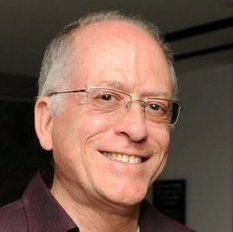 The most enjoyable suspense novels, in my opinion, are those that take place in exotic locations. I am fascinated by stories set in Japan, or in Paris, or which use Caribbean islands as their setting, because by reading these books, I feel like I have traveled the world. The authors, if they do their job well, transport me to places I’ve never been. By reading their colorful descriptions, I stamp the passport of my imagination and expand my mind.
The most enjoyable suspense novels, in my opinion, are those that take place in exotic locations. I am fascinated by stories set in Japan, or in Paris, or which use Caribbean islands as their setting, because by reading these books, I feel like I have traveled the world. The authors, if they do their job well, transport me to places I’ve never been. By reading their colorful descriptions, I stamp the passport of my imagination and expand my mind.
In most thrillers, even those set in exotic locations, the action moves ahead at breakneck speed, but I want more! Tell me the history of the place, talk to me about the religion of its people, and explain the traditions and daily life of those who live there. Once I have all that background in my mind, reading a suspense novel is much more meaningful to me.
I wish I could tell the authors to slow down, just a bit. If the characters are racing through a marketplace in Istanbul, describe the smells and sounds of their surroundings. What do they see, what do they eat? The protagonist is human, after all. Even though he is chasing the villain, or escaping his nemesis, the protagonist still needs to sit down and eat lunch.
When a novel is set in a foreign country, I long to read about the unique foods and drinks on offer. I not only want to learn about the book’s unique setting; I also want to taste it with all my senses.
In my writing, I try to include this missing ingredient: the taste and feel of the location where the action takes place. My book, Valley of Thracians ��� a suspense novel set in modern day Bulgaria ��� is not your usual thriller, because it highlights the setting. Some have called it a combination of mystery and travelogue. Bulgarian food, history, religion, and culture all play roles in the novel, making the scenic background an important element of the story.
My characters eat shopska salad, drink rakia, and have banitsa for breakfast. If all this sounds foreign to you, yet appetizing, you are invited to read my novel.
You may never have previously considered Bulgaria as a travel destination, but you should. The country has something for everyone, from majestic mountains and picturesque villages, to wondrous sea shores and ancient Roman ruins. Bulgaria, a member state of the European Union, is quickly catching up with the modern world, yet it takes care to preserve its history and culture. More than anything else, Bulgarians are extremely hospitable and visiting the country is quite affordable. If you can’t make the journey, read Valley of Thracians. You will enjoy the suspense and mystery, and the book will also introduce you to the culture, history, and even the tastes of Bulgaria.
A Peace Corps volunteer has gone missing in Bulgaria and everyone assumes he is dead, everyone except his grandfather, who refuses to give up hope. Retired literature professor Simon Matthews launches a desperate search only to be lured into a bizarre quest to retrieve a stolen Thracian artifact���a unique object of immense value others will stop at nothing to recover.
Matthews travels through a Balkan landscape dotted with ancient tombs and fortresses, unaware that his grandson has been confined to an isolated mountain cabin, slowly recovering from a severe head injury. Nothing can be taken at face value, as the woman assisting Matthews in his quest and the nurse caring for his injured grandson may have ulterior motives in helping the two reunite. Even when Matthews succeeds in joining up with his grandson, departure from Bulgaria is only possible if the missing relic can be found.
Valley of the Thracians is available on the Kindle from Amazon.
About Ellis Shuman
Born in the United States and with a permanent home in Israel, Ellis Shuman lived in Bulgaria for two years, traveling extensively throughout the country. He is the author of the suspense novel Valley of Thracians and the short story collection The Virtual Kibbutz. He is a book reviewer for The Times of Israel; a travel columnist at The Huffington Post; and a popular blogger with tips for writers. Learn more about Ellis on his blog, or follow him on Twitter.

January 19, 2015
Monday’s Friend: Barbara Ehrentreu
Today I’m pleased to welcome Barbara Ehrentreu back to the blog, as my first guest of 2015.�� Barbara writes novels for teens, about the problems real teens face, and when I was in high school I used to love reading books like this.�� She’s back to tell us about how a real-life traumatic event inspired her newest novel After.�� Take it away, Barbara!
My Thoughts on Writing After
By Barbarah Ehretreu
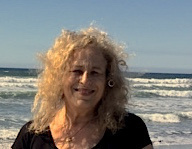 Sometime in October of 2006 my husband had a very bad heart attack and it required him to have bypass surgery. After the surgery he had a great many complications due to the fact that he had asthma and his heart was very damaged. Plus he had a reaction to the anesthetic called ICU delirium. So I was visiting him every day and spending most of my time in the hospital. That November I decided to do NaNoWriMo, which is National Novel Writing Month to see if I could write a novel in thirty days. So when I started to write the whole experience of the night when my husband had his heart attack it was very fresh in my mind. Lauren, the main character, came to me and suddenly I knew that I had to write about the whole experience.
Sometime in October of 2006 my husband had a very bad heart attack and it required him to have bypass surgery. After the surgery he had a great many complications due to the fact that he had asthma and his heart was very damaged. Plus he had a reaction to the anesthetic called ICU delirium. So I was visiting him every day and spending most of my time in the hospital. That November I decided to do NaNoWriMo, which is National Novel Writing Month to see if I could write a novel in thirty days. So when I started to write the whole experience of the night when my husband had his heart attack it was very fresh in my mind. Lauren, the main character, came to me and suddenly I knew that I had to write about the whole experience.
When I write I usually don���t put anything down until I have the first sentence. Then I can continue from there and write usually two thousand words without stopping. As you can see I am a ���pantser���. This is what happened. Suddenly I couldn���t stop writing and even though I was visiting my husband every day and going through a horrible experience due to his delirium and his very slow recuperation, I came back to write and try to get to my goal. After awhile I couldn���t write anymore due to the events that were unfolding. He had pneumonia and it was the kind where you needed to visit wearing a gown and gloves. Plus he barely knew us and being with him was very difficult. So I put away the story, then called When My Life Changed, and left it alone until after my husband had returned to a fairly normal life. The next year I reread it and finished it. I never know the ending to a book until I can no longer write anything more. If it changes anything in the book then I go back and fix everything to work with the ending. Then I sent it to my critique group and several beta readers. When I read their comments I decided to put it away and didn���t think about it for years.
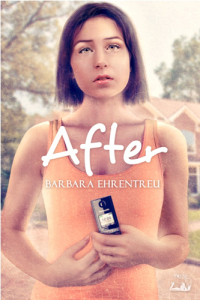 There is so much in After, which had its name changed during the editing process, that came right from my own life. The whole first scene was taken almost word for word from the night my husband had his heart attack. The descriptions of the hospital and his condition came from my own experience and so did the emotions. In fact, one of the things my critique group said was that some scenes were flat without emotion, even though these were the ones where I had the most emotions in real life. This was the hardest part, because I had to go back and rewrite these scenes remembering the emotion but doing it in a more objective way. Sometimes when you write strong emotions you have to go outside of yourself and see the scene as a camera might. Getting emotional scenes right is the hardest part of writing something you have experienced in real life
There is so much in After, which had its name changed during the editing process, that came right from my own life. The whole first scene was taken almost word for word from the night my husband had his heart attack. The descriptions of the hospital and his condition came from my own experience and so did the emotions. In fact, one of the things my critique group said was that some scenes were flat without emotion, even though these were the ones where I had the most emotions in real life. This was the hardest part, because I had to go back and rewrite these scenes remembering the emotion but doing it in a more objective way. Sometimes when you write strong emotions you have to go outside of yourself and see the scene as a camera might. Getting emotional scenes right is the hardest part of writing something you have experienced in real life
If not for The Muse Online Writing Conference I would never have even thought about publishing this book. Three years ago I was taking a workshop during this conference from Margot Finke for first lines in your novel. I used the first line of this novel and Margot loved it. So I went back to the manuscript and revised it some more. I decided I would try to get it ready for publication. Then after stalling for another year I did send it out after my daughter Rachel helped me rewrite a few things, and it was accepted. That is why I dedicated it to her.
I didn���t write After for any reason other than to revisit my own experience, but now that it is published I feel that it could be a big help to anyone who had to go through this. I also love the way Lauren and Joey who are BFF���s have their relationship change due to Lauren���s father���s illness. Of course that is the part that is really fiction. To find out more you might want to read the book, which is available from MuseItUp Publishing, Amazon and Barnes and Noble as well as IBooks, and Smashwords.
Blurb for After
After is a story about the struggles Lauren Walstein, a fifteen-year old girl, goes through when her father suddenly has a heart attack and undergoes bypass surgery. In one phone call her life changes completely. Her best friend since kindergarten, Joey, is going out with her enemy and they have grown apart. Before the phone call all she thought about was getting a scholarship for softball and the Mets. Suddenly she must deal with both her father���s illness and being in school. The demands on her from both ends complicate the story. In the middle of all this, she finds she is developing feelings for her best friend that are more than friendly. Is he feeling the same or is he just comforting her? Does her father recover? In addition there is Joey���s mean girl friend Amber, who doesn���t appreciate Lauren in the picture.
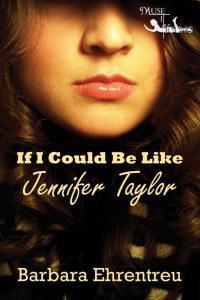 Blurb for If I Could Be Like Jennifer Taylor
Blurb for If I Could Be Like Jennifer Taylor
Carolyn Samuels is obsessed with the idea of being popular. She is convinced that the only thing keeping her from happiness is her too heavy for fashion body and not being a cheerleader. Hyperventilating when she gets nervous doesn���t help. When she is paired for a math project with the girl who tormented her in middle school, Jennifer Taylor, she is sure it is going to be another year of pain. With Carolyn���s crush on Jennifer���s hunky junior quarterback, Brad her freshman year in high school looks like a rerun of middle school. When Jennifer is the only student who knows why she fell in gym class, Carolyn is blackmailed into doing her math homework in return for Jennifer���s silence. Jennifer takes on Carolyn as a pity project since she can���t be seen with someone who dresses in jeans and sweatshirts. When Jennifer invites Carolyn to spend the night to make her over and teach her to tumble, Carolyn learns Jennifer���s secret and lies to her own friends to cover it up. Will Carolyn become a cheerleader and popular? Does she continue to keep Jennifer���s secret? Or will she be a target of this mean girl again?
Author bio:
Barbara Ehrentreu grew up in Brooklyn and moved to Queens. She has lived and taught in Long Island, Buffalo, NY and Westchester, NY as well as a year in Los Angeles, CA. She has a Masters Degree in Reading and Writing. Currently she is retired from teaching and living in Stamford, CT with her family. If I Could Be Like Jennifer Taylor won second prize in Preditors & Editors as Best Young Adult Book for 2011. It was inspired by Paula Danziger for her children’s writing workshop at Manhattanville College. Her second book, After, considers what can happen to a teen when her father becomes ill with a heart attack. It is based on her own experiences when her husband had a heart attack and the aftermath of what she and her family experienced. She is preparing the sequel to If I Could Be Like Jennifer Taylor. Barbara also writes poetry and several of her poems are published in the anthologies, Prompted: An International Collection of Poetry, Beyond the Dark Room, Storm Cycle and Backlit Barbell. She has a blog, Barbara’s Meanderings, and she hosts a radio show on Blog Talk Radio, Red River Radio Tales from the Pages once a month.
Find Barbara online at the following links:
Facebook
Twitter
Goodreads
Google+
Where to buy Barbara’s books:
After
MuseItUp Publishing:��http://museituppublishing.com/bookstore/index.php/young-adult/after-detail
Amazon:��http://www.amazon.com/After-Barbara-Ehrentreu-ebook/dp/B00NDYDC3C/ref=la_B00J0URGVM_1_2?s=books&ie=UTF8&qid=1418409175&sr=1-2
For Nook on Barnes and Noble: http://www.barnesandnoble.com/w/after-barbara-ehrentreu/1120349821?ean=2940046242980
If I Could Be Like Jennifer Taylor (print and ebook)
MuseItUp Publishing: http://museituppublishing.com/bookstore/index.php/museityoung/if-i-could-be-like-jennifer-taylor-detail
Amazon:��http://www.amazon.com/If-Could-Like-Jennifer-Taylor-ebook/dp/B005NWRLL6/ref=la_B00J0URGVM_1_1?s=books&ie=UTF8&qid=1418409175&sr=1-1
For Nook on Barnes and Noble: http://www.barnesandnoble.com/reviews/If-I-Could-Be-Like-Jennifer-Taylor%2FBarbara-Ehrentreu/1105870667?csrfToken=7tl0EbMuS9kryS71CGU8jWQqfAkqgZfa&sort=3#reviews

January 17, 2015
My Life in Books: Hitchhiker’s Guide to the Galaxy
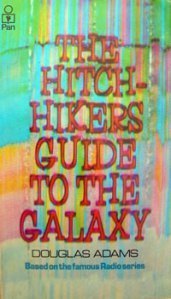 We are now into the 1990s on this list of books that have made an impact on my life in some way.�� Technically this book should be earlier in the list, as the first time I read it was some time in the mid-80s.�� But I have read it several times, so perhaps chronologically it doesn’t really matter.
We are now into the 1990s on this list of books that have made an impact on my life in some way.�� Technically this book should be earlier in the list, as the first time I read it was some time in the mid-80s.�� But I have read it several times, so perhaps chronologically it doesn’t really matter.
This was the first book that made me laugh out loud.�� The first time I read it, I was in high school.�� I remember laughing reading it on the bus on the way to school, and getting some very odd looks from my fellow passengers.�� But I’ve laughed just as loudly in subsequent re-readings.
Douglas Adams’ strange sense of humour was unique.�� Who else could decide that the answer to the question of life, the universe and everything is 42?�� This may say something about the people in my social circles (most of whom are fellow geeks), but on any social occasion if someone mentions the meaning of life, someone else will pipe up with, “42”.�� Who else could decide that the worst swear word in the universe is “Belgium”?
His most famous quote is, “I love deadlines.�� I love the whooshing noise they make as they go by.”�� I think a lot of us can relate to that one – especially writers.
The character of Arthur Dent, reluctant space traveller and Ordinary Bloke, stumbles through his adventures (wearing his pyjamas and dressing gown for the whole of the first book) with a sense of disbelief, like he can’t believe it’s all really happening.�� Rumour has it that Douglas Adams based this character on himself.�� It’s probably no accident that Arthur Dent’s initials are the reverse of Douglas Adams’.
The Hitchhiker’s series was supposed to be a trilogy, but there ended up being rather more than that.�� None of them were ever quite as good as the first and original.
I was really upset to hear the news of Douglas Adams’ death, at age 49 in 2001.�� Apparently he had a heart attack after going to the gym.
I always suspected that working out was bad for your health.

January 4, 2015
Best Books of 2014
As always, I have been using Goodreads to keep track of the books I read throughout the year. I set myself a goal to read 65 books in 2014. I actually managed to read 71.
The number of books I have been reading since I started keeping track on Goodreads has been steadily increasing year on year. Just look at the stats:
2011 – 55 books read
2012 – 60 books read
2013 – 63 books read
2014 – 71 books read
I am not sure why this number is increasing. I have started reading books on the journey in to work, whereas I used to read the newspaper, so that’s a difference. I used to take the underground from London Bridge to Holborn every morning, which required changing trains and a great deal of walking to get from one platform to another, which would interrupt my reading time. This year I’ve started taking the bus instead, which is a straight 20 minutes of uninterrupted reading time before I have to get off. So I think that’s made a difference too.
Another noticeable change in reading habits in this past year is the increasing number of books I have read on the Kindle, as opposed to paper books. In fact the only paper books I read were those that I was sent by Shots e-zine to review for them, those that I picked up as freebies from conventions and those that had been given to me as gifts or were already on my shelves (for instance the Sue Grafton and Sara Paretsky books). Every new book that I purchased myself, I bought as a Kindle version. The convenience of the Kindle is making a significant impact on my reading habits, and now that I have a plastic waterproof cover for it, I can even read it in the bath (which is another place I like to get some quiet reading time).
I started the year re-reading the Sara Paretsky books, who as I have mentioned many times is and always will be one of my all-time favourite authors. I enjoy all of her books, and many of the five-star rated books of 2014 are hers. I read many excellent books in 2014. However, since there were all of 16 books I gave five stars to, this already makes for a long list of ‘Best books read in 2014′. So although there are many deserving four-star books that should be on the list, the final cut contains only the ones I rated five stars. Some of them I have reviewed on Goodreads, and the link is included. Others I have included a few words about below the title.
Lamentation – CJ Sansom
This is the sixth book in the excellent crime series about Matthew Shardlake, hunchback lawyer in the time of Henry VIII, and it just as good as the previous in the series. The series is not only excellently researched, but each one has featured one of Henry’s six Queens, in chronological order. In this latest book, Henry is dying and his last Queen, Catherine Parr, has written a book called ‘Lamentation of a Sinner’ that has been stolen. Shardlake is hired to find out who stole the book and retrieve it, for if it gets out into the public domain it could prove the Queen guilty of treason.
The religious and political instability of this era is effectively portrayed. My only worry was that with the death of Henry VIII there would be no more Shardlake books. Without giving away too much, however, the end of this book sets the stage for a potential new era of Shardlake adventures.
Before I Go Sleep – SJ Watson
A film starring Nicole Kidman and Colin Firth was released of this book last year. It’s the sort of plot where you either read the book or see the film because once you know the ending, it’s a fairly major spoiler.
The premise of the plot is that Christine Lucas has suffered an accident that affects her long-term memory. Every day she wakes up with no memory of the last twenty years, and the man she wakes up next to, who tells her he is her husband, is a stranger to her. It’s a frightening concept, but as Christine tries to explore her surroundings she discovers she has secrets she has not been telling her husband. Who can she trust?
This book is a very exciting and gripping thriller, and I was hooked from the first chapter.
V is for Vengeance – Sue Grafton
W is for Wasted – Sue Grafton
Sue Grafton is another of my all-time favourite authors, and I love her feminist, kick-ass heroine Kinsey Millhone. The books are all set in the 1980s, when Grafton started the series, and she says she is going to stop at Z. So there will only be three more, which makes me sad. However, this is another series I shall enjoy re-reading, since it’s been some time since I read the early books and I can’t remember much about them.
The Secret Place – Tana French
This is book five of the Dublin Murder Squad series, and I haven’t read the other four, but found this book in my pile of free booty from the Harrogate Crime Writing Festival. It involves the murder of a teenage boy on the grounds of an expensive boarding school for girls. The investigating officers whittle the list of suspects down to eight girls – two groups of four, close-knit clusters of friends. But who killed Chris Harper? I really wanted to find out. And this book about adults moving around in the world of adolescent girls made me feel really glad I am long past that stage of life – been there, done that, no wish to go back thank you very much.
Breakdown – Sara Paretsky
Hardball – Sara Paretsky
Blacklist – Sara Paretsky
Hard Time – Sara Paretsky
Tunnel Vision – Sara Paretsky
Guardian Angel – Sara Paretsky
Burn Marks – Sara Paretsky
Body Work – Sara Paretsky
I worship the ground Ms Paretsky walks on. I’ve re-read every VI Warshawski book, and in doing so came across a couple that were new to me (‘Hardball’, which somehow I missed the first time around, and the latest book ‘Breakdown’). I now eagerly await the next book, out later this year. VI Warshawski is now in her fifties, though, and I wonder how much longer she can run around scaling walls and getting shot at.
Stone Bruises – Simon Beckett
Merivel: A Man of His Time – Rose Tremain
The Accident – CL Taylor
Sometimes I browse the Kindle specials store, and end up finding something really good for 99p. This was one of those occasions. The premise involves a teenage girl who ends up in a coma after deliberating stepping in front of a bus. Her mother, desperate to find out why her daughter tried to kill herself, starts to investigate and discovers some murky secrets in her daughter’s life that she knew nothing about. It’s another suspenseful page-turner.
And so this is my review of the best books I read in 2014. I have set myself a goal to read 70 books in 2015. Could be a challenge, but the Kindle is charged and loaded with plenty of unread books, all ready for my return to the day job and the London commute tomorrow. I suppose that’s one good thing about the days the train service is appalling. The longer it takes me get home, the more reading time I have.


